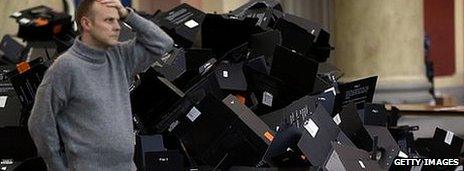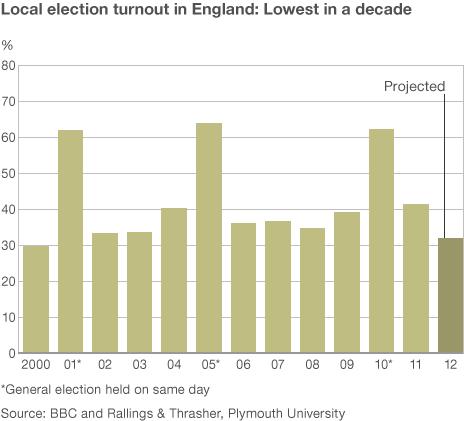Vote 2012: The end of the elected mayor dream?
- Published

It was one of the government's big ideas. Give the people of England's main cities powerful mayors. Ministers said directly elected leaders would provide more effective local government, allowing the cities to compete with London and other international centres.
But these elections exposed a gaping chasm between the pro-mayor rhetoric, and the reality of an electorate deeply suspicious of the idea of yet more elected politicians. The sense that MPs were already scrambling for comfortable £100K+ berths running big cities was also damaging.
Many local councillors were opposed to elected mayors from the start. Some feared a challenge to their powers. Others said "why change a system that's working?" With the main parties divided on the issue, the "yes" campaigns lacked funding and organisation.
In some cities I visited recently (including Nottingham and Sheffield) there was no sense at all that a campaign was under way. People started handing out leaflets when our TV cameras were rolling, but quickly disappeared when we'd finished. We had to drive 10 minutes to find a single campaign poster. Most of the people we stopped in the street seemed blissfully unaware that a moment of decision was approaching.
Local government reformers feel this has been a huge missed opportunity. They continue to argue that the best, most vibrant cities in the world have elected mayors. Many simply can't understand why there's been such antipathy in the Midlands and North of England. Surely, they say, a high-profile visible mayor would give a city significant extra clout?
But, is it so much of a surprise? Most of the referendums that have been held in recent years on devolving power in England have failed (remember John Prescott's regional assemblies). Yes, people say they are frustrated and disillusioned with local government. There is, though, also a strong anti-politics current out there. With spending cuts being felt in many areas, the idea that the answer to a city's problems is another politician was anathema to many.
The other big problem for the "yes" campaign was a lack of clarity about exactly what powers these mayors would have. Voters were told that it would be up to mayors themselves to negotiate their extra powers once elected. But, there was no specific promise of extra money for cities that voted "yes". Indeed Manchester recently managed to argue for more funding without a mayor.
The Cities Minister Greg Clark has been putting a brave face on defeat today. He argues that the transition to a mayoral system may be an evolution rather than a revolution.
After all, he says, there are now elected mayors in London, Leicester, Liverpool, Bristol and Middlesbrough. Doncaster voted last night to keep its mayor despite a campaign to ditch the position. The suggestion is that people tend to warm to the idea of a mayor once the job is established.
But the overwhelming message from voters is that when it comes to mayors - they either don't want one, or don't really care.

- Published4 May 2012
- Published4 May 2012
- Published4 May 2012
- Published4 May 2012
- Published4 May 2012